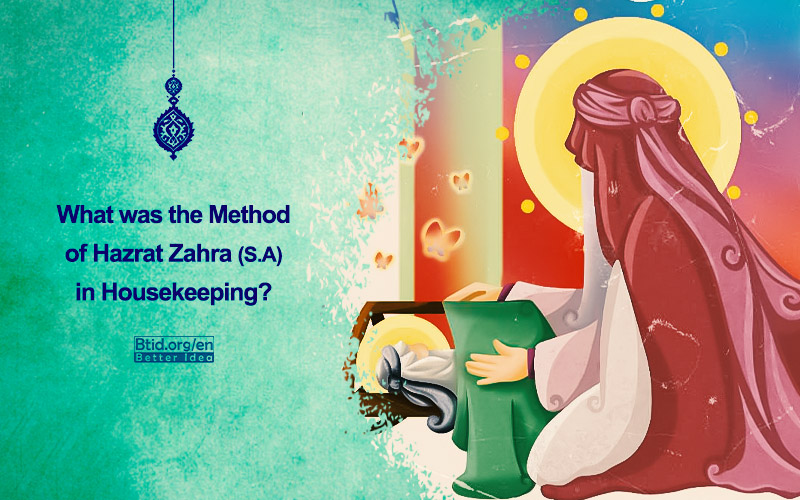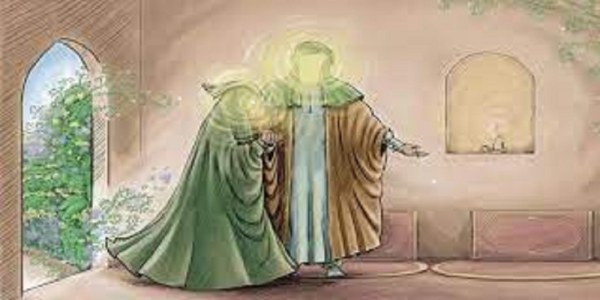-

What was the Method of Hazrat Zahra (S.A) in Housekeeping ?
First of all, it should be said that the personality of the first lady of Islam, Hazrat Zahra (S.A), is beyond the scope of limiting her only to housekeeping and husbandry. In other words, the character of women is not valued only by the criteria of housekeeping and wifehood, just as Maryam bint Imran (A.S) was an outstanding character without having a husband. Nevertheless, many narrations have been narrated about the way of keeping a house and having a wife of Hazrat Fatimah (S.A), and we mention a part of them in this article as follows:
A) Housekeeping Method
1. Division of work:
It is reported that when the Messenger of God (PBUH) assigned Faza Nubia to the service of Hazrat Zahra (S.A), he asked her to choose between making dough and baking bread, and she also made the dough. choose [1] Regarding the division of household chores with their husbands, it has also been said that HazratZahra (S.A) was in charge of making flour and baking bread, and Ali (A.S) accepted tasks such as sweeping and collecting firewood.[2]
2. Effort:
According to the hadiths, Hazrat Zahra (S.A) had drawn so much water with a musket (or bucket) that its place remained on her body, and she had ground so much that her hands were covered with calluses.[3]
It is also narrated that the Messenger of God (PBUH) saw his daughter Zahra (S.A) wearing a camel skin "abaya" and grinding with one hand and breastfeeding her child with the other hand. The eyes of the Prophet (PBUH) filled with tears and he said to Fatima (PBUH):
"My daughter! Put the bitterness of this world in front of the sweetness of the hereafter. “Aring a camel skin abaya and grinding with one hand and breastfeeding her child with the other hand. Fatimah (S.A) said:
O Prophet of God (PBUH)! because of the many blessings that the Lord has given me, I am grateful to Him and I thank Him for His love. And at this time, the verse "And soon your Lord will grant you so that you will be pleased "[4]was revealed to the Prophet.[5]
Also, Salman Farsi reports that Hazrat Fatimah (S.A) was grinding barley with a mill whose handle was covered in blood, and Hussain (A.S) was also crying in a corner. I said to them:
O daughter of the Prophet (PBUH)! Even though the space is idle, your hands are injured due to work?! Fatimah said: The Prophet (PBUH) ordered me to do the housework on one day and on him on the next day, and he has done his work yesterday. I said to Fatimah: I am your father's freedman! Let me either grind the barley or silence Hussain (A.S)! Fatemeh (S.A) said: I can silence Hussain better, you grind! I had ground some barley when it was time for prayer. I got up and prayed with the Prophet (PBUH). After the prayer, I told Ali (A.S) what I had seen. He cried and left and returned smiling shortly after. The Prophet (PBUH) asked Ali (A.S), why are you smiling?! He replied: I went to Fatimah (S.A), I saw her sleeping and Hussein (A.S) had also fallen asleep on her chest and his mill was working by itself. The Prophet (PBUH) smiled and said: O Ali (A.S)! You know that God has many angels on earth who will serve Muhammad and the family of Muhammad (PBUH) until the Day of Resurrection. [6]
3. Simplicity of Life:
It is mentioned in a narration that Imam Ali (A.S) and Hazrat Fatima (S.A)'s mattress was a piece of leather that they used to sleep on while sleeping.[7] The pillow and pillow of Hazrat (A.S) was also a skin filled with a palm leaf.[8]
b) Method of having a wife
1. Adapting to problems:
It has been narrated that Ali (A.S) asked Zahra (S.A), do we have anything to eat?! Hazrat Zahra (S.A) answered in the negative and said:
In the last two days, we only had the same food that I had given you, and I did not eat any food myself! Ali (A.S) was sad and said: I wish you had informed me so that I would have prepared something! Zahra (A.S) replied: I am ashamed of God to ask you for something that I know is difficult for you to provide![9]
2. Harmony with the Wife:
In the context of the revelation of the verse "Yufon Balnazar"They make vows [10], it is stated: "Ali (A.S) went to his Jewish neighbour whose name was 'Shimoun' Wool spinning and whose occupation was a wool spinner and said:
Will you give me some wool?" So that the daughter of Muhammad (PBUH) will touch it for you in front of three Sa'a Jo?! The Jew accepted. Ali (A.S) returned with Wool and barley and informed Fatimah (S.A) about the incident. After spinning a third of the wool, Fatimah (PBUH) ground one sa' of barley and prepared dough and baked five loaves of bread with it".[11]
3. Paying attention to the needs of the wife: Hazrat Zahra (PBUH) sewed clothes for her husband to protect his body better in wars.[12]
References:
[1] Mohd Abtahi, Muhammad Baqir, Awalam Uloom wa Ma'arif wa Ahwaal Man Al-Ayat wa Al-Akhbar wa Al-Aqwal (Mustadrak Sayyida al-Nisa to Imam Al-Jawad), Vol. 11, p. 1043, Qom, Imam Al-Mahdi AJ Foundation, I, 1413 AH.
[2] Tousi, Muhammad bin Al-Hassan, Amali, p. 661, Qom, Dar al-Taqwa, I, 1414 AH.
[3] Ibn Babouyeh, Muhammad Ibn Ali, Man La Yahdrah al-Faqih, vol. 1, p. 321, Qom, Islamic Publications Office, second edition, 1413 AH.
[4] Surah 93:5 Al-Zuha وَلَسَوْفَ يُعْطِيكَ رَبُّكَ فَتَرْضَ;
[5] Thaalbi Neishaburi, Ahmed Ibn Ibrahim, Al-Kashf and Al-Bayan on Tafsir al-Qur'an, vol. 10, p. 225, Beirut, Dar Ihya Al-Tarath al-Arabi, first edition, 1422 AH.
[6] Qutb al-Din Ravandi, Saeed bin Hibatullah, al-Kharaij wa al-Jaraih, vol. 2, p. 530, Qom, Imam Mahdi Institute (AS), first edition, 1409 AH.
[7] Hamiri, Abdullah bin Jafar, Qarb al-Isnad, p. 112, Fam, Al-Al-Bayt Foundation, first edition, 1413 AH.
[8] the same; Ibn Tavus, Ali Ibn Musa, Al-Dru'a Al-Waqiyyah, p. 275, Beirut, Al-Al-Bayt Foundation, first edition, 1415 AH.
[9] Kufi, Firat bin Ibrahim, Tafsir of Firat al-Kufi, p. 83, Tehran, Est.
[10] "They keep their vow"; Man, 7.
[11] Sadouq, Mohammad Bin Ali, Emali, p. 257, Tehran, Katabachi, 6th edition, 1376; Bihar al-Anwar, vol. 35, p. 237.
[12] Ibn Shahr Ashub Mazandarani, Muhammad Bin Ali, Manaqib Al Abi Talib (AS), vol. 3, p. 246, Qom, Allameh, first edition, 1379




